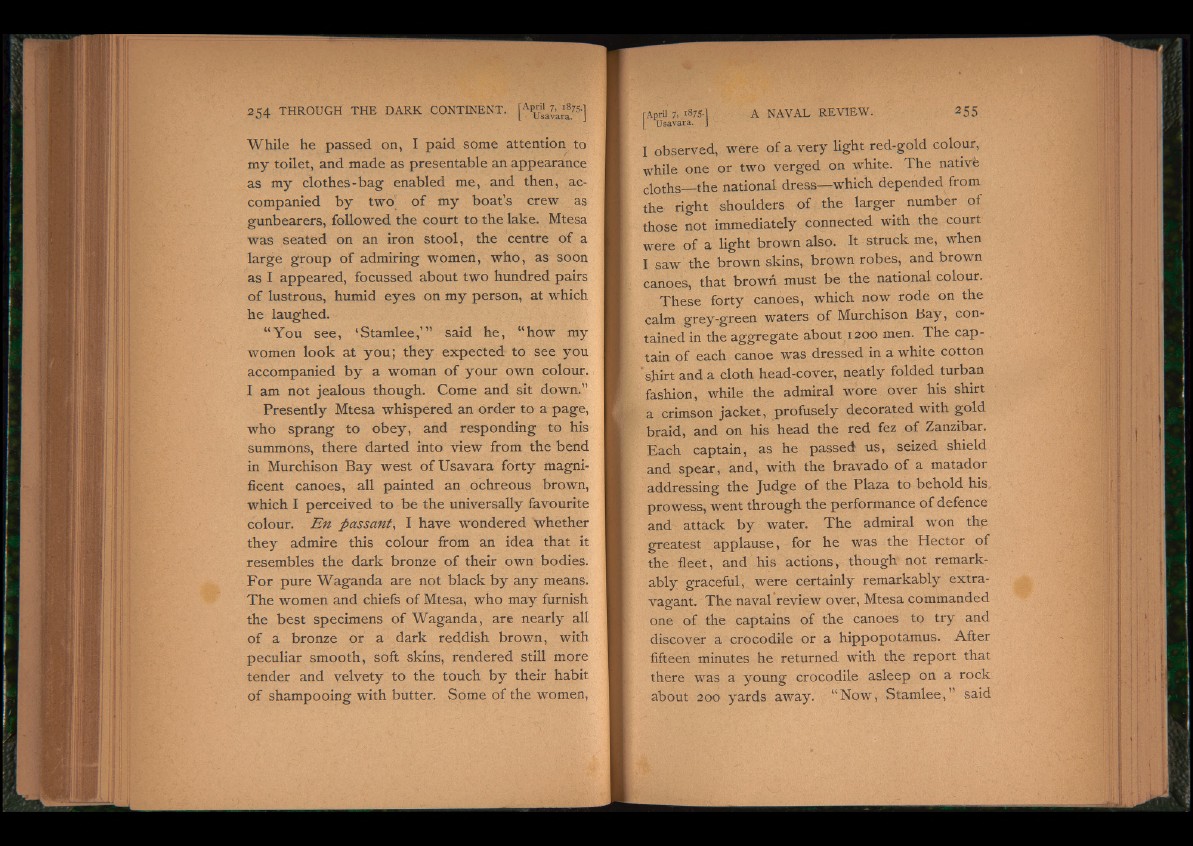
While he passed on, I paid some attention to
my toilet, and made as presentable an appearance
as my clothes-bag enabled me, and then, accompanied
b y two' o f my boat’s crew as
gunbearers, followed the court to the lake. Mtesa
was seated on an iron s too l, the centre o f a
large group o f admiring women, who, as soon
as I appeared, focussed about two hundred pairs
o f lustrous, humid e ye s on my person, at which
he laughed.
“ Y o u see , ‘Standee,’ ” said he, “ how my
women lo o k at you; th ey expected to see you
accompanied b y a woman o f yo u r own colour.
I am not jealous though. Come and sit down.”
Presently Mtesa whispered an order to a page,
who sprang to o b e y , and responding to his
summons, there darted into view from the bend
in Murchison B a y west o fU sa v a ra for ty magnificent
canoes, all painted an ochreous brown,
which I perceived to be the universally favourite
colour. E n p a ssa n t, I have wondered whether
th e y admire this colour from an idea that it
resembles the dark bronze o f their own bodies.
F o r pure Waganda are not black b y any means.
The women and chiefs o f Mtesa, who may furnish
the best specimens o f Waganda, are nearly all
o f a bronze or a dark reddish brown, with
peculiar smooth, soft skins, rendered still more
tender and v e lve ty to the touch b y their habit
o f shampooing with butter. Some o f the women,
rApril 7, 1875-1 A NAVAL REVIEW.
[ Usavara. J
I observed, were o f a v e ry light red-gold colour,
while one or two verged on white. The nativè
cloths— the national dress— which depended from
the right shoulders o f the larger number o f
those not immediately connected with the court
were o f a light brown also. It struck me, when
I saw the brown skins, brown robes, and brown
canoes, that brown must be the national colour.
These forty canoes, which now rode on the
calm grey-green waters o f Murchison Ba y, contained
in the aggregate about 1200 men. The cap tain
o f each canoe was dressed in a white cotton
shirt and a cloth head-cover, neatly folded turban
fashion, while the admiral wore over his shirt
a crimson jacket, profusely decorated with gold
braid, and on his head the red fez o f Zanzibar.
Each captain, as he passed us, seized shield
and spear, and, with the bravado o f a matador
addressing the Judge o f the Plaza to behold his
prowess, went through the performance o f defence
and attack b y water. T h e admiral won the
greatest applause, for he was the Hector o f
the fleet, and his actions, though not remark-
ably graceful, were certainly remarkably extravagant.
T he naval review over, Mtesa commanded
one o f the captains o f the canoes to tr y and
discover a crocodile or a hippopotamus. After
fifteen minutes he returned with the report that
there was a young crocodile asleep on a rock
about 200 yards away. “ Now, S tan d e e ,” said